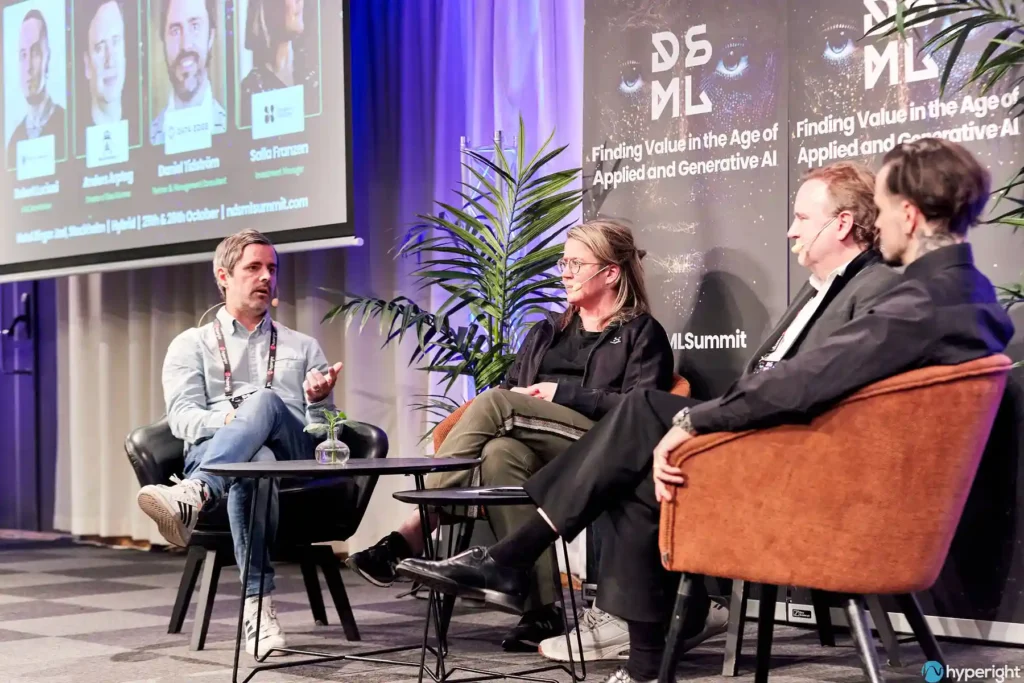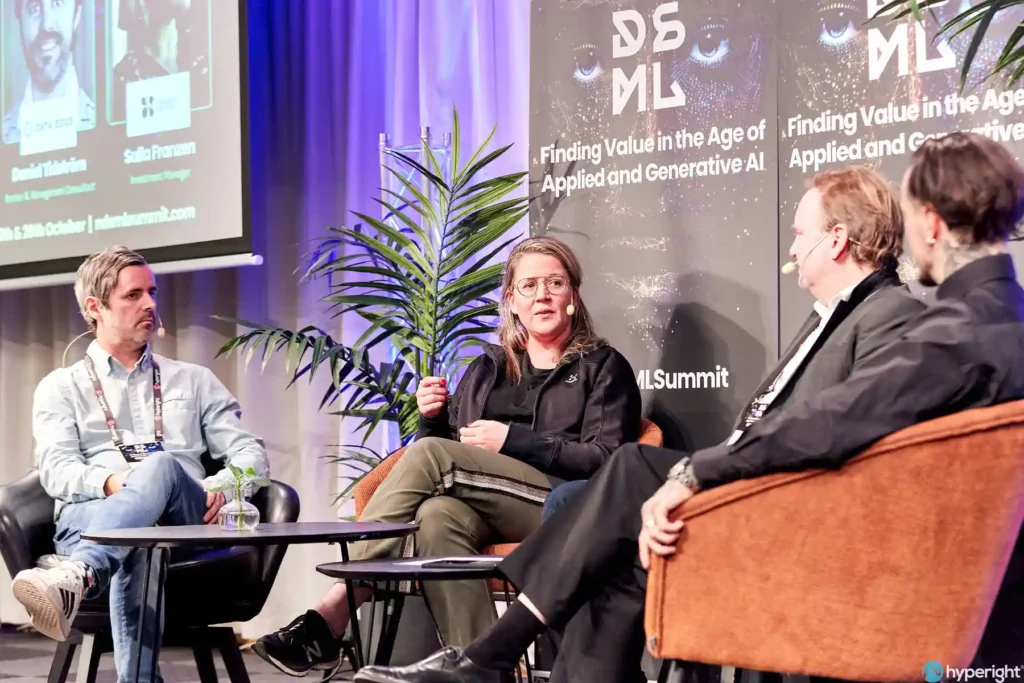It’s no secret that we live in an era filled with digital advancements and transformative technologies in data science, machine learning, and artificial intelligence. As a result, keeping up with the latest advancements and technologies is no easy feat. Professionals and businesses are demanded to adopt a proactive approach to stay at the forefront of technology.
How can you effectively navigate through the fast-changing landscape of data science, machine learning, and artificial intelligence? What steps are required for organizations to adapt to this technological frontier?
These are some of the questions explored during the panel ’’How to Prepare for a Fast-Changing DS/ML/AI Landscape – Trends, Challenges and Opportunities’’ at the Nordic Data Science and Machine Learning NDSML Summit 2023. Industry experts gathered to present ways for overcoming challenges and uncover opportunities for individuals and organizations seeking to navigate through the dynamic landscape of data science, machine learning, and artificial intelligence.


Robert Luciani, AI & Data Advisor at The AI Framework leads the panel and is joined by esteemed industry experts. The participants include Anders Arpteg, Director of Data Science at Swedish Security Service, Daniel Tidström, Partner & Management Consultant at Data Edge, and Salla Franzen, Investment Manager at Navigare Ventures AB. The panelists offer a glimpse into the current state and future of data science, machine learning, and artificial intelligence, untangling advancements, challenges, and implications for both businesses and society at scale.
The Rapid Pace of AI Advancements
AI technologies are propelling industries into a future filled with endless possibilities. Within this transformative landscape, panelists bring their attention to the revolutionary speed of generative AI. This acceleration is not solely based on theory; instead, it is significantly shaping product development and influencing application strategies across various industries. This development cycle is, in turn, a double-edged sword, offering countless opportunities for innovation, yet posing significant challenges in staying abreast of emerging technologies.
Open Source and Big Tech: Achieving a Balance
The discussion delves into the profound impact of open-source initiatives and major tech corporations on shaping the landscape of artificial intelligence. Open-source projects, known for their community-driven nature and accessibility are essential in democratizing AI technologies. However, panelists brought their attention to the complexity in translating these open-source models into scalable solutions. On the other hand, big tech companies, with their extensive resources, data access, and infrastructure, are establishing a strong defense which can sometimes hinder the overall innovation and diversity in the field.
The Rise of New Role: AI Product Managers
The evolving AI landscape has led to the emergence of new professional roles, especially AI product managers. These individuals bridge the gap between technical AI teams and business stakeholders, ensuring that AI initiatives align with business objectives and deliver tangible value. The panelists emphasize that successful AI strategies are those that effectively combine technical potential with a deep understanding of business needs, user experiences, and market trends.
The Critical Role of Data Scientists and AI Product Managers
In the context of these changes, data scientists and AI product managers are recognized as key players in leveraging AI for business success. Data scientists are tasked with not only developing sophisticated AI models but also identifying practical, impactful applications for these technologies. AI product managers, on the other hand, are crucial in navigating the intersection of AI capabilities and business strategy, ensuring that AI initiatives are aligned with organizational goals and market needs.
As AI technologies become more pervasive, legal and ethical considerations come to the forefront. Panelists highlight the criticality of navigating these aspects thoughtfully. They stress the importance of developing and implementing AI solutions that are technically sound and ethically responsible and compliant with emerging legal frameworks.
Looking Ahead: Predictions and Insights into the Evolution of AI
Looking towards the future, the panelists speculate on the trajectory of AI development. They envision a landscape marked by more specialized, knowledge-centric AI solutions and a deeper integration of AI into various industry sectors. However, they also caution about the societal and ethical implications of these advancements, advocating for a balanced approach that considers the broader impact of AI on humanity.
Furthermore, they discuss the practical challenges businesses face in implementing AI solutions. They emphasize the need for a user-centric approach to AI applications, focusing on understanding and addressing real user needs and business objectives.
Regulation and Development of AI and Culture
The discussion continues into the potential impacts of regulatory frameworks like the European AI Act on AI development. Concerns are raised about the possibility of regulations affecting smaller companies and startups, which might lack the resources to navigate complex legal landscapes. An interesting aspect of the discussion is the influence of cultural and linguistic diversity on AI development. Panelists point out the necessity of incorporating diverse cultural inputs into AI models to ensure they reflect a broader range of human experiences and avoid biases.
For enterprises, these insights of the NDSML Summit are not just general but have real, tangible implications. In an era where AI is becoming a cornerstone of competitive strategy, understanding these trends and challenges is crucial. Businesses must be agile, adaptable, and forward-thinking in their approach to AI.


Key Takeaways
1. Rapid AI Evolution
The swift evolution of AI is fundamentally reshaping various industries, introducing transformative changes at a fast pace. It becomes evident that the speed of generative AI is a driving force behind the transformation of product development methodologies. However, the acceleration that fuels innovation also presents a challenge, demanding efforts to stay abreast of the ever-emerging technologies.
2. Striking a Balance Between an Open Source and Big Tech
The democratization of AI through open-source initiatives underscores the essence of technological progress, enabling developers to contribute to cutting-edge technologies. Despite its benefits, the challenge persists in translating open-source innovations into scalable solutions due to complexities in scalability and adaptability. Moreover, big tech’s substantial resources defend innovation but pose the risk of limiting diversity within the AI landscape. Balancing the innovation-driving force of big tech with the inclusive nature of open source is a critical challenge for the AI community, demanding concerted efforts to address scalability challenges while ensuring a diverse and sustainable future for AI.
3. New Roles in AI Landscape
In the rapidly evolving landscape of artificial intelligence, the emergence of AI product managers has become increasingly important, serving as the anchor that connects the technicalities of AI development with the dynamic demands of business. These professionals play a crucial role in cultivating successful AI strategies, skillfully navigating the balance between harnessing the full technical potential of AI and ensuring a user-centric approach that resonates with the diverse needs of the end-users.
4. Legal, Ethical, and Regulatory Focus
As AI continues to spread through various facets of our lives, it necessitates a conscientious approach to navigate the legal and ethical considerations that follow. The omnipresence of AI technologies underscores the importance of not only understanding but proactively addressing the ethical implications associated with their deployment. In this context, strict adherence to regulatory frameworks, such as the European AI Act, emerges as a cornerstone in ensuring responsible and ethically sound AI development practices.
5. Strategic Business Adaptation
When it comes to technological innovation, enterprises are compelled to cultivate agility and forward-thinking approaches in their adoption of artificial intelligence. The seamless integration of AI strategies with overarching business goals becomes paramount, requiring a strategic alignment that not only enhances operational efficiency but also propels the organization toward sustained success. Moreover, as ethical considerations take center stage in the development and deployment of AI technologies, enterprises must skillfully navigate the ethical landscapes to meet societal expectations and secure their reputation.


In Summary
The panel “How to Prepare for a Fast-Changing DS/ML/AI Landscape – Trends, Challenges and Opportunities” at the NDSML Summit 2023 offers a comprehensive overview of the current and future trends in AI, underscoring the need for a balanced approach that combines technical innovation with ethical and practical considerations.
As we step into the future, the ability to adapt, innovate, and ethically harness the power of AI will be the key to success in this dynamic field.
We invite you to dive into the full panel discussion for a more in-depth exploration of this topic. Learn from more than 1000 practical case study videos with Hyperight Premium, and elevate your knowledge in the AI and data-driven world beyond limits.














Add comment